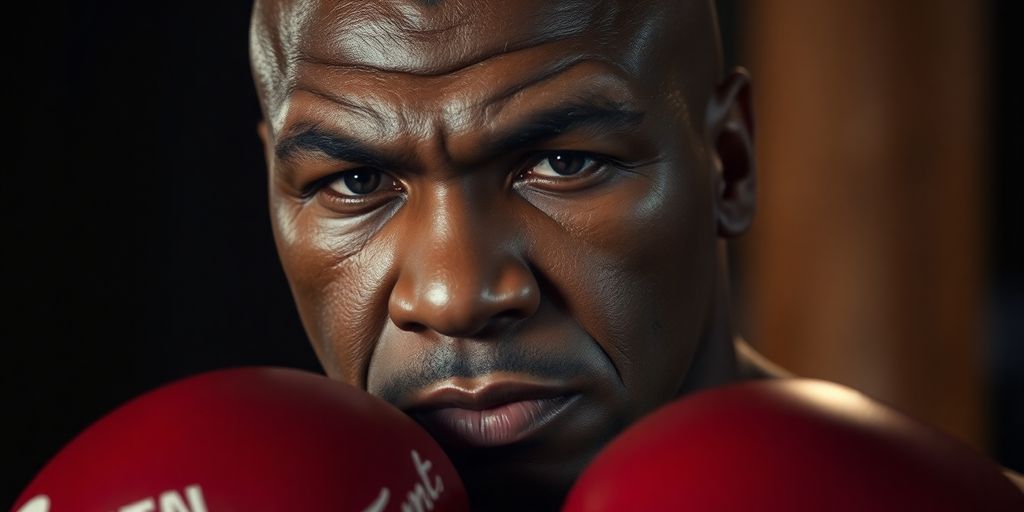Mike Tyson, once hailed as the youngest heavyweight champion in boxing history, faced a dramatic downfall that led him to prison. His life took a sharp turn in the early 1990s, culminating in a conviction that changed his trajectory forever. This article explores the events that led to his incarceration, the impact it had on his life and career, and how he emerged from the experience.
Key Takeaways
- Mike Tyson became the youngest heavyweight champion at just 20 years old.
- His conviction for rape in 1992 stemmed from an incident involving Desiree Washington.
- Tyson served three years of a six-year sentence before being released in 1995.
- His time in prison led to significant personal changes and reflections on his past actions.
- Tyson’s post-prison career was marked by a mix of comebacks and controversies, including battles with addiction.
The Rise Of Mike Tyson

Early Life And Challenges
Mike Tyson’s story is one of incredible highs and devastating lows, and it all started with a difficult childhood. Growing up in Brownsville, Brooklyn, he faced poverty, crime, and a general lack of opportunity. His early life was marked by frequent run-ins with the law, and he spent time in juvenile detention centers. It was during this period that his boxing talent was discovered, offering him a potential escape from his surroundings. Cus D’Amato, a legendary boxing trainer, recognized Tyson’s raw potential and took him under his wing, providing him with structure, discipline, and a surrogate father figure. This mentorship was crucial in shaping Tyson’s early career and instilling in him the skills and mindset needed to succeed in the ring.
Becoming The Youngest Heavyweight Champion
Tyson’s ascent to the top of the boxing world was nothing short of meteoric. Under D’Amato’s guidance, he quickly rose through the ranks, displaying a ferocious fighting style and unmatched power. His early fights were characterized by devastating knockouts, and he soon became a must-see attraction. In 1986, at the age of 20, Mike Tyson won the heavyweight title, becoming the youngest heavyweight champion in history. This achievement catapulted him to international fame and solidified his status as a boxing prodigy. His combination of speed, power, and aggression made him a formidable opponent, and he seemed virtually unstoppable.
Fame And Fortune
With the heavyweight title came immense fame and fortune. Tyson became a global icon, gracing magazine covers and commanding huge pay-per-view audiences. His fights generated millions of dollars, and he enjoyed a lavish lifestyle filled with expensive cars, mansions, and celebrity endorsements. However, this newfound wealth and fame also brought its own set of challenges. Tyson struggled to manage his finances and was surrounded by people who sought to exploit his success. The loss of Cus D’Amato early in his career left a void in his life, and he lacked the guidance and support needed to navigate the complexities of fame. Despite his success in the ring, Tyson’s personal life became increasingly turbulent, setting the stage for the events that would later derail his career.
Tyson’s rise was meteoric, but the seeds of his downfall were sown early. The lack of a stable support system and the pressures of fame contributed to a series of poor decisions that would ultimately lead to his imprisonment. His story serves as a cautionary tale about the challenges of navigating success and the importance of having strong guidance and support.
Here’s a quick look at his title defenses:
- March 7, 1987 vs James Smith
- May 30, 1987 vs Pinklon Thomas
- August 1, 1987 vs Tony Tucker
The Incident That Changed Everything
Meeting Desiree Washington
So, things took a really dark turn for Tyson in the early ’90s. It all started with Desiree Washington. She was an 18-year-old beauty pageant contestant, and their paths crossed in Indianapolis. This meeting would ultimately lead to Tyson’s conviction and imprisonment. It’s one of those situations where you think, "How could things go so wrong, so fast?"
The Events Of July 1991
July 1991 is when everything went sideways. Tyson was in Indianapolis for a boxing event, and Washington was there for the Miss Black America pageant. They met, hung out, and then… well, that’s where the stories diverge. What’s clear is that something happened between them in Tyson’s hotel room. The details are disputed, but the consequences were very real. It’s a classic case of conflicting accounts and a situation that quickly spiraled out of control. The media went wild, and the whole thing became a huge mess. It’s hard to imagine the pressure both of them were under during that time.
Allegations And Arrest
Washington accused Tyson of rape. The allegations were serious, and the police got involved pretty quickly. Tyson was arrested, and the case went to trial. It was a media circus, with everyone taking sides and offering their opinions. The whole thing was incredibly divisive, and it seemed like the world was watching. It’s a stark reminder of how quickly things can change, especially when fame and power are involved. The arrest marked a significant turning point, setting the stage for a trial that would captivate and divide the nation. The rape charges were a serious matter.
It’s easy to look back and judge, but it’s important to remember that these were real people dealing with a very difficult situation. There were no winners in this case, only different kinds of loss.
The Trial And Its Aftermath
Conviction And Sentencing
The trial itself was a media circus. It felt like everyone had an opinion on Mike Tyson’s guilt or innocence. The prosecution painted a picture of a violent encounter, while the defense tried to argue consent. Ultimately, the jury sided with Desiree Washington. On February 10, 1992, Mike Tyson was found guilty of rape.
He faced some serious time. On March 26, 1992, the judge sentenced Tyson to six years in prison, plus four years of probation. It was a stunning fall from grace for the former champ. There were appeals, of course, but they didn’t go anywhere. The Indiana Court of Appeals upheld the conviction, and the Indiana Supreme Court was deadlocked, letting the lower court’s decision stand.
Public Reaction
The public’s reaction was all over the place. Some people were outraged by the crime and felt justice was served. Others, particularly some in the Black community, felt Tyson was unfairly targeted. There were protests, debates on TV, and endless arguments in bars and living rooms. It really divided people. Some saw him as a symbol of lost potential, while others saw him as a dangerous criminal. It was a complicated situation with no easy answers.
Impact On Tyson’s Career
Obviously, going to prison had a huge impact on Tyson’s boxing career. He was stripped of his titles, and his image was tarnished. He went from being one of the most famous athletes in the world to a convicted felon. It put his career on hold, and it was unclear if he’d ever be able to come back. The boxing world was left wondering what could have been. His absence created a void, and other fighters stepped up to fill it. But there was always a sense that something was missing without Tyson in the ring.
The conviction and sentencing marked a significant turning point in Tyson’s life. It wasn’t just about the time he spent behind bars; it was about the loss of his career, his reputation, and his place in the public eye. It forced him to confront his demons and, eventually, to try and rebuild his life.
Life Behind Bars
Prison Experience
Life in prison wasn’t easy for Mike Tyson, as you might imagine. He was assigned to the Indiana Youth Center, now known as the Plainfield Correctional Facility. It’s a far cry from the glitz and glamour he was used to. Adjusting to the rigid structure and loss of freedom was a huge challenge. He had to learn to navigate a completely different social environment, one where his fame didn’t necessarily translate to respect, and sometimes even made him a target. He spent his days like everyone else there, following the prison’s schedule.
- Waking up early for meals.
- Working assigned jobs.
- Dealing with the constant tension.
Prison is a tough place, no matter who you are. It strips you down and forces you to confront yourself. For Tyson, it was a period of intense self-reflection, whether he wanted it or not.
Personal Transformation
Surprisingly, prison became a period of significant personal change for Tyson. He began to read extensively, exploring philosophy and history. He started to question his past actions and consider his future. He even embraced Islam during his time inside, finding solace and guidance in his new faith. This spiritual awakening played a big role in his efforts to reform his behavior and outlook on life. He also started working out more seriously, using exercise as a way to channel his aggression and maintain some semblance of control over his life. Workout routine helped him lose 70 pounds.
Time Served
Mike Tyson didn’t serve his full sentence. He was released in March 1995, after serving less than three years. Even though it was a reduced sentence, the experience left a lasting mark on him. Upon release, he had prison tattoos of Arthur Ashe, Mao Zedong, and Che Guevara. He also had to register as a sex offender under federal law. The world was watching to see if he had truly changed, or if he would revert to his old ways. The question on everyone’s mind was: what would Mike Tyson do next?
Release And Return To Boxing

After serving his time, the world waited to see what Mike Tyson would do. Could he reclaim his former glory, or would prison have changed him too much? The answer, as it turned out, was complicated.
Reclaiming The Heavyweight Title
Tyson’s return to boxing was highly anticipated. His first fights back were against Peter McNeeley and Buster Mathis Jr., both of which he won easily. These wins set the stage for a title shot. In 1996, he defeated Frank Bruno to regain the WBC Heavyweight title. He then won the WBA title against Bruce Seldon. It felt like the old Tyson was back, but things were never quite the same.
Continued Controversies
Despite regaining the heavyweight title, Tyson’s career continued to be plagued by controversy. The most infamous incident was the 1997 rematch against Evander Holyfield, where Tyson bit Holyfield’s ear, resulting in his disqualification and suspension. This event cemented his image as a volatile and unpredictable figure. It’s hard to forget the Holyfield rematch.
Struggles With Addiction
Throughout his career, and especially after his release from prison, Tyson battled with addiction. These struggles often overshadowed his boxing achievements and contributed to his erratic behavior. He has been open about his issues with drugs and alcohol, seeking help and working towards sobriety. It’s a constant battle, and it’s one that has shaped his life in profound ways.
Tyson’s post-prison life has been a mix of triumphs and tribulations. He’s shown glimpses of his former brilliance in the ring, but his personal demons have often gotten in the way. His story is a reminder that even the most talented individuals can struggle with addiction and the challenges of life after prison.
Here’s a quick look at some of his post-prison fights:
- Peter McNeeley (Win)
- Buster Mathis Jr. (Win)
- Frank Bruno (Win)
- Evander Holyfield (Loss)
- Roy Jones Jr. (Exhibition Draw)
Legacy Of The Prison Years
Cultural Impact
Mike Tyson’s time in prison definitely left a mark that goes beyond just boxing. He became a symbol, in a way, for redemption and the possibility of change, even after messing up big time. You saw him pop up in movies, TV shows, and even commercials, often playing on his past image but also showing a different, sometimes comedic, side. It’s like people were both fascinated and a little scared by him, which made him super interesting to watch. His story became part of the broader conversation about fame, downfall, and second chances in American culture.
Influence On Future Generations
It’s hard to say exactly how Tyson’s experiences shaped younger athletes, but you can see some connections. His raw talent and aggressive style were definitely something a lot of boxers tried to copy. But, his troubles outside the ring also served as a cautionary tale. It showed that talent alone isn’t enough; you need to handle the pressures of fame and fortune, or it can all fall apart. Plus, his openness about his struggles with mental health and addiction helped start conversations that are still going on today. It’s a reminder that even the toughest guys face challenges. boxing style is something that many people still talk about.
Reflections On His Past
In recent years, Tyson has been pretty open about looking back at his life, including his time in prison. He’s talked about how it forced him to grow up and take responsibility for his actions. He’s also been involved in different ventures, like his podcast and cannabis business, which seem like ways for him to control his own narrative and show that he’s more than just the "bad guy" he was once portrayed as. It’s like he’s trying to rewrite his story, not by erasing the past, but by showing how he’s learned from it.
It’s interesting to see how someone who was once so feared and controversial has managed to find a place in the public eye again. It shows that people are willing to forgive and give second chances, but it also puts the responsibility on the individual to prove they’ve changed. Tyson’s journey is a reminder that everyone’s story is complex, and there’s always room for growth and redemption, even after making big mistakes.
Final Thoughts on Mike Tyson’s Prison Sentence
Mike Tyson’s time in prison marked a significant turning point in his life. Convicted of rape in 1992, he faced a harsh reality that changed his public persona forever. While he was once the youngest heavyweight champion, his fall from grace was steep. Serving three years of a six-year sentence, Tyson’s experience behind bars was tough, but it also led him to reflect on his life choices. After his release, he tried to rebuild his career and reputation, but the shadow of his past always lingered. Tyson’s story is a reminder of how quickly fame can turn into infamy, and how important it is to take responsibility for one’s actions.
Frequently Asked Questions
What led to Mike Tyson’s imprisonment?
Mike Tyson was sent to prison after being convicted of rape in 1992. He was accused of raping an 18-year-old beauty pageant contestant named Desiree Washington.
How long did Mike Tyson spend in prison?
Tyson was sentenced to six years in prison but was released after serving about three years, in March 1995.
What was the public reaction to Tyson’s conviction?
The public had mixed feelings about Tyson’s conviction. Some supported him, while others were shocked and outraged, given his fame and the nature of the crime.
Did Mike Tyson’s career continue after prison?
Yes, Tyson returned to boxing after his release and even regained the heavyweight title in 1996, but he faced many controversies and legal issues afterward.
How did prison change Mike Tyson?
During his time in prison, Tyson experienced personal growth and transformation. He reflected on his life and made changes to his behavior.
What is Mike Tyson’s legacy after his prison years?
Tyson’s legacy is complex. He is remembered as a talented boxer but also for his legal troubles and personal struggles. His story serves as a cautionary tale for many.













